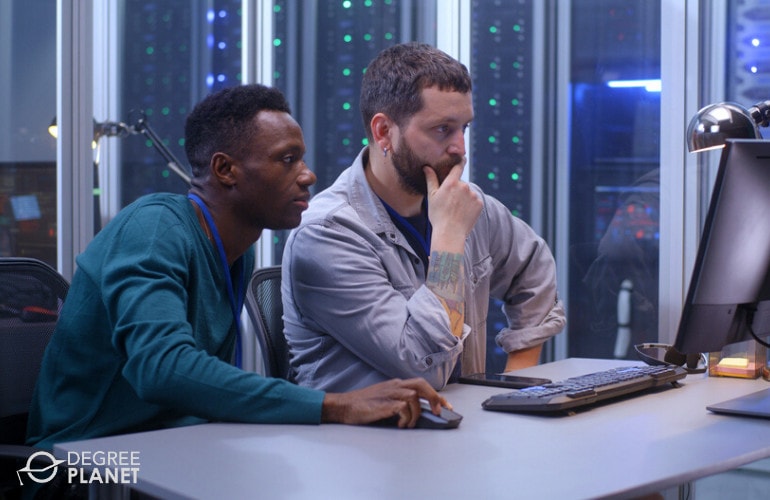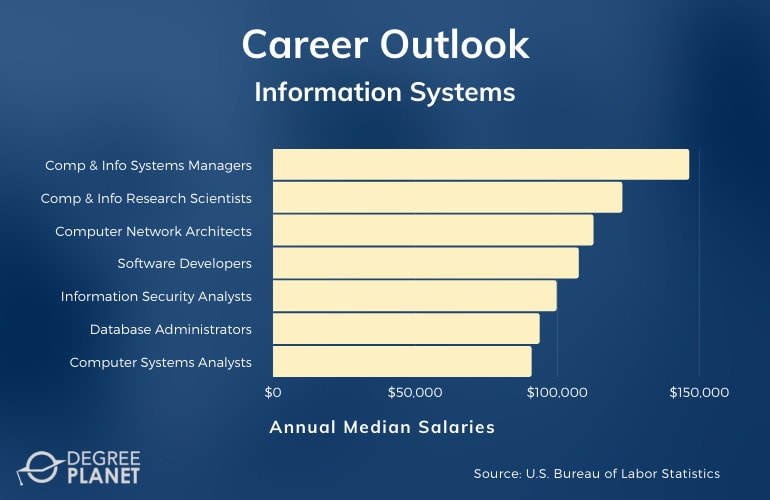Is a masters in information systems worth it? An information systems master’s degree can teach you about how businesses use technology to organize information.

A masters degree in information systems can help you develop your technological and business savvy.
Editorial Listing ShortCode:
Knowledge acquired from a masters in information systems can be useful in many different industries and careers.
Is a Masters in Information Systems Worth It?

Yes, a masters in information systems is worth it for many students. The Bureau of Labor Statistics is projecting 11% job growth in business and financial occupations over the next 10 years.
Common information systems careers in this field include computer and information research scientist, information security analyst, network and computer systems administrator, computer systems analyst, and computer programmer. An MS in Information Systems can help prepare you for a variety of tech and business careers.
Most businesses in the modern world rely on information systems to keep track of data and to keep data secure. There is an ongoing need for expertise in information systems, and there are many job options in this field.
Editorial Listing ShortCode:
A graduate degree in information systems can increase your likelihood of advancing your current career or obtaining a high paying position in this field.
A Master of Science in Information Systems can generally help you improve your critical thinking and problem solving skills. When studying information systems, it is beneficial to think analytically and to be skillful with technology.
How to Decide Whether a Masters in Information Systems Is Right for You

Wondering if CIS is a good major for you?
Here are a few characteristics that can help you determine if a masters degree in information systems is a good fit.
1. You want to pursue a career in technology.
A masters in information systems can help you understand applications of technology in the business world. You can learn to use programs and software that organize information and keep it secure.
This type of degree may show employers that you have the right skill set to be a network administrator or to perform a similar role.
2. You like solving complex problems.

The study of information systems may be well suited to someone who is highly analytical and enjoys solving complex problems.
The study of information systems can involve learning multiple computer programming languages as well as technological components, such as circuit boards and processors.
3. You have good communication and interpersonal skills.
There is a false stereotype that people in tech careers tend to have poor social skills. Rather, information systems professionals often need to work collaboratively to solve problems.
Being a team player can be an asset in the field of information systems.
5 Things You Can Do with a Masters Degree in Information Systems

The following are five common jobs you may pursue with a masters degree in information systems.
1. Computer and Information Research Scientist
Computer and information research scientists conduct research on how to solve computing problems.
They can plan and carry out experiments and record the results. They may also publish their findings in academic journals or present them at conferences. This career path requires an innovative mind and a desire to continue to improve upon existing technology.
2. Information Security Analyst

Information security analysts may work for businesses, ensuring that sensitive data is secure from hacking and cyberattacks.
They can test cybersecurity measures by simulating an attack, looking for vulnerabilities, and then looking for ways to improve security. They typically install software such as firewalls and data encryption programs.
3. Network and Computer Systems Administrator

Network and computer systems administrators install and maintain hardware and software and work to keep a company’s computer systems operating properly.
Their duties can include ensuring that employees’ work stations are connected to a central network and making decisions about what software upgrades are needed.
4. Computer Systems Analyst

Computer systems analysts work to make a company’s computer systems as efficient and effective as possible.
They look for ways to improve the system’s existing hardware or software and conduct tests to look for problems. They can choose and configure new software or customize computer systems for a company.
5. Computer Programmer
Computer programmers write codes that enable software to function correctly. They often need to be proficient in several programming languages.
Editorial Listing ShortCode:
Computer programmers tend to work more independently rather than with other people.
Master’s in Information Systems Alternatives

Here are some other related degree programs that you may consider if you are interested in technology and information systems.
- Master’s in Information Technology. A master’s of information systems covers how to apply technology and computer systems within the larger ecosystem of the business world. A degree in information technology focuses more specifically on the technology itself.
- Master’s in Computer Science. A master’s in computer science teaches theoretical knowledge about how computers work. This type of degree emphasizes higher level math and abstract thinking.
- Master’s in Business Analytics. This type of degree covers using and applying data in a business to inform decision-making.
Information systems degrees can somewhat overlap with other various types of degrees related to business and technology.
Some people also wonder, what’s the difference between MIS vs. CIS? MIS often concentrates more on analytics—examining data to draw out useful insights. CIS typically is more concerned with the technical aspects, such as computer architecture and coding languages.
Information Systems Master’s Careers & Salaries

According to the Bureau of Labor Statistics, the following careers are related to the study of information systems.
| Careers | Annual Median Salaries |
| Computer and Information Systems Managers | $151,150 |
| Computer and Information Research Scientists | $126,830 |
| Computer Network Architects | $116,780 |
| Software Developers | $110,140 |
| Information Security Analysts | $103,590 |
| Database Administrators | $98,860 |
| Computer Systems Analysts | $93,730 |
| Computer Programmers | $89,190 |
| Network and Computer Systems Administrators | $84,810 |
| Web Developers | $77,200 |
There are many well-paying job opportunities in the field of information systems. A masters can help you receive higher starting pay and may even boost your chances of obtaining a management role.
What Jobs Can You Get with a Masters in Information Systems?

Because almost all modern businesses use information systems of some kind, a master’s in information systems can be applied in many different industries.
In any industry, most jobs you can get with a master’s in information systems are going to involve computer systems and data storage. Job titles in these types of positions can vary, but common ones include information security analyst and database administrator.
Editorial Listing ShortCode:
Information systems jobs usually pay annual salaries that are well above the national average. For instance, according to the Bureau of Labor Statistics, information security analysts earn a median annual salary of $103,590.
The highest paying occupations related to information systems are computer and information research scientist, computer network architect, software developer, and information security analyst.
What Is the Difference Between Information Systems vs. Information Technology?

Information systems refers to the entire system that stores and uses information. This includes non-technological components, such as the people who work at a company and use an electronic data storage system.
A degree in information technology focuses specifically on the technology involved. A degree in information systems deals with the bigger picture and includes a more holistic understanding of how information technology is used and applied within a business.
There is often some overlap in the required coursework to obtain either of these degrees. Both types of degrees often lead to corporate jobs that can involve helping businesses make the best possible use of technology, computer networks, and data storage systems.
Getting Your Masters in Information Systems Online

Pursuing a masters in information systems degree online may be the next step in your career. A masters can help qualify you for a new and higher-paying job. It may also enable you to advance in your current career.
With technology playing such an important role in the modern business world, a master’s in information systems is likely to be a sought-after degree by employers in the coming decade. There are many information systems graduate degree programs available online.
Online degree programs are a convenient option for many students since they do not require commuting to campus or moving to a new a city to attend school. The flexibility of online learning can be especially helpful to those who have work or family responsibilities.
If you’re ready to continue your educational journey, you can start by exploring online masters programs from accredited universities.

